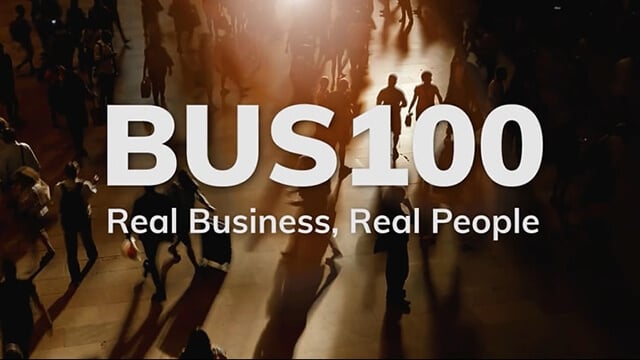Here’s a no-cost way to complete gen eds. Get details
Bachelor of Science in Information Technology
PROGRAM AT A GLANCE
40 bachelor's courses
11 weeks long
$ 1525
Cost per course
Flexible learning
Online and in-person programs at select campuses, subject to availability
Information technology: Get skills for today and for what comes next.
Looking for an edge to help grow your abilities in IT? Pick up skills and hands-on expertise with an online Bachelor of Science in Information Technology from Strayer. Choose from concentrations in artificial intelligence, cybersecurity, data analytics, cloud computing, data management, IT project management, networking or software development.
Navigate the digital age with an IT degree
Gain a solid foundation in information technology (IT) skills and prepare to tackle computer science and technology challenges with an online bachelor’s degree from Strayer. You’ll learn cybersecurity fundamentals and explore how to apply existing and emerging technologies to improve business operations.
Skills you’ll learn in a Strayer BSIT
- How to build technology solutions to solve organizational problems
- Communication of technical information
- Application of security best practices
- Management of information technology and systems
Explore BSIT concentrations
At Strayer, we offer our students a wide range of IT concentrations, allowing you to customize learning to support your interests and career goals. If you can’t decide, your admissions officer is here to help.
Find the concentration that best meets your goals:
Earn your degree from an accredited university
Strayer University is an accredited institution and a member of the Middle States Commission on Higher Education (MSCHE or the Commission) www.msche.org. Strayer University’s accreditation status is Accreditation Reaffirmed. The Commission’s most recent action on the institution’s accreditation status on June 22, 2017 was to reaffirm accreditation. MSCHE is recognized by the U.S. Secretary of Education to conduct accreditation and pre-accreditation (candidate status) activities for institutions of higher education including distance, correspondence education, and direct assessment programs offered at those institutions. The Commission’s geographic area of accrediting activities is throughout the United States.

Select your concentration in IT
Choose from multiple concentrations, tailored to fit your goals. If you can’t decide, your admissions officer is here to help.
Estimate the cost of your degree
How much does a bachelor's in information technology cost?
Estimate the cost of your degree
How much does a bachelor's in information technology cost?
Expected Graduation
...
Approximate Total
...
*Student is required to take two courses per quarter during disbursement period
PREPARING YOUR RESULTS
Time commitment
Calculate the approximate time commitment of your degree.
| Course load | ... courses/term |
| Classroom time | ... hours/week |
| Terms per year | ... terms |
| Terms to graduation | ... terms |
Cost analysis
Calculate the approximate cost of your degree
| Tuition | ... |
| Books | ... |
| Fees | ... |
| No-cost gen ed | $0 |
| Transfer credits | ... |
| Transfer Credit Scholarship | $0 |
| $4K scholarship | $0 |
| Strayer Learn and Earn Scholarship | $0 |
| Approximate total | ... |
Program cost breakdown
In most cases, the Strayer BS program consists of 40 courses, with the price of $1,525 per course in tuition. There are additional fees for textbooks and supplies, a $65 technology fee each term, and a one-time $150 degree conferral fee.
Transfer credits
Courses from another institution may be eligible for transfer to Strayer, which can reduce the number of courses you need to graduate and your overall tuition. Bachelor’s students can transfer up to 28 classes toward the bachelor’s degree (if approved). Strayer’s transfer credit page has more information as well as a tool to estimate how many transfer credits you may be able to apply to your Strayer degree program.
Scholarships and financial aid
There are a number of financial aid options worth exploring on our financial aid page. To apply for federal aid, prospective students should fill out the Free Application for Federal Student Aid (FAFSA) form. Stafford loans are available for graduate study. These are direct unsubsidized loans, not based on financial need. Unlike subsidized loans, Stafford loan interest will accrue while in the program. Making interest payments while in school will help reduce the amount of principal that would otherwise build up.
There are also scholarships and private loans available for Strayer students.
Save up to $15,250 on your Strayer bachelor’s degree by accessing your general education courses through our affiliate, Sophia.*
*Savings assumes transferring 10 courses taken at Sophia. Eligibility rules apply. Connect with us for details.
Courses from another institution may be eligible for transfer to Strayer, which can reduce the number of courses you need to graduate and your overall tuition. Bachelor’s students can transfer up to 28 classes toward the bachelor’s degree (if approved). Strayer’s transfer credit page has more information as well as a tool to estimate how many transfer credits you may be able to apply to your Strayer degree program.
More than 500 organizations invest in their employees by partnering with Strayer University to offer access to tuition savings and other educational benefits. If your employer is a corporate partner, you may qualify for programs that can help you discover career pathways in your field.
Private loans
Nonfederal loans may pay the difference between the cost of attendance and the total of loans and grants received from other tuition assistance programs. The terms and conditions of federal loans are often more favorable than private loans and should be considered before exploring private loans.
Military tuition assistance
Scholarships are offered to eligible students currently serving in the military as well as military spouses. Strayer is also approved by Veterans Affairs to accept and process veteran education benefits. Learn more about Strayer’s active military assistance program here.
Veteran benefits
In addition to participating fully in the Yellow Ribbon Program, Strayer is approved by Veterans Affairs to accept and process veteran education benefits. Student veterans can receive transfer credit for eligible military training and life experiences.
What coursework do you need for a BS in Information Technology?
Your courses in the bachelor’s in information technology program can give you a solid foundation in tech skills and prepare you to start on your career path – or advance to the next level. View all courses.
What is a minor in college?
A minor is a group of five courses in a select subject area that can add depth to your resume and round out your degree. Pursuing a minor offers you the opportunity to gain knowledge and skills in a secondary area of interest outside of your major and concentration.
How does a minor work?
Since you can use elective courses to complete a minor, in some cases you may not have to spend extra time or money on additional courses to complete your degree. Keep in mind that courses used to complete your major can’t be applied toward a minor.
Should you get a minor in college?
Getting a minor can help give you professional skills. It demonstrates your forward thinking, self-motivation and organization – all valuable skills in the workplace.
Sample courses

This course introduces students to the general purpose of information systems in organizations and their use of personal productivity software. Students will demonstrate tasks in common application software to include word processing, web browsing, spreadsheet modeling, database management, and presentation graphics.

Altering a recipe, planning a road trip, buying a car, and financing college—what do all of these things have in common? An understanding of numbers and how to use and interpret them. In the workplace, business, technology, and criminal justice professionals all use math. In this course, you will learn how to approach mathematics in a way that will positively inform your world. Learn how to use an easily understandable approach for basic math and algebra to create meaning and see the world in a new way.

This course examines and implements the principles of argumentation. An argumentative paper is researched and developed based on the concept of writing as a process. The course focuses on the logical organization of ideas patterned on established structures of argument. The course reinforces the importance of the research process and critical evaluation of sources. Acknowledging the intellectual property of others through the proper documentation of sources is stressed. Prerequisite ENG 115 or ENG 116.

Provides a foundation in today's business operations with a focus on the major functions of a business (management, production, marketing, finance and accounting, human resource management, and various support functions). The course also provides an overview of business organizations and the competitive business environment, strategic planning, international business, ethical considerations, quality assurance and more.
This course introduces students to the fundamentals of networking technology. The focus of the course will include networking protocols, topologies, hardware and operating systems. Topics include data communications, telecommunications, infrastructure security, inter/intranetworking and the application of networking to multimedia, information storage and distribution.
This course is an integrative capstone course for the Bachelor of Science in Information Technology program. The course takes a senior management approach to examine and solve real-world problems and projects. Students will apply project management techniques to create integrative information technology solutions that include databases, systems analysis, security, networking, computer infrastructure, human-computer interaction and web design.
This course covers the concepts, design and querying of databases using the Structured Query Language (SQL), including large datasets, objects and data dictionaries, system privileges and security functions. Prerequisite: CIS376.
This course introduces students to best practices in the Amazon Web Services (AWS)® Cloud. It introduces design patterns to solve problems and troubleshoot various real-world cloud service scenarios. Opportunities to explore case studies and to build actual infrastructures through labs and hands on activities are provided throughout. This course is designed to support students in preparation for the AWS® SysOps Administrator – Associate certification exam. Prerequisite: CIS437.
This course introduces students to best practices in the design of repeatable, configurable and deployable networking and storage solutions in the Amazon Web Services (AWS)® Cloud. Opportunities to explore case studies and to build actual infrastructures through labs and hands on activities are provided throughout. This course is designed to support students in preparation for the AWS® SysOps Administrator – Associate certification exam. Prerequisite: CIS447.
This course provides an overview of artificial intelligence, exploring its history, applications and impact on various industries. The course also covers ethical considerations and societal implications of AI. Practical exercises using popular AI tools and frameworks will provide hands-on experience.
This course introduces learners to the concept of prompt engineering, a crucial aspect of building AI models that understand and generate human-like text. They will explore techniques for prompt design, optimization, and fine-tuning, with an emphasis on natural language processing tasks. Students will learn techniques for designing prompts, understanding their impact on model performance and leveraging prompts for various AI applications. Prerequisite: CIS211
This course focuses on developing programming skills necessary for AI applications using the Python programming language. Students will learn Python programming techniques and libraries commonly used in AI development and they will gain proficiency in writing Python code to solve AI related problems. Prerequisites: CIS261 and CIS211
Bachelor’s in IT admission requirements
Before you can pursue your bachelor’s degree, you have to enroll at Strayer. Here’s what you need to get started for admission to the university.
Learn more about the admission process at Strayer. Students applying to Washington, D.C., or New Jersey campuses must provide proof of proper immunization.
Transferring to Strayer from another university?
Some or all of the credits you’ve earned may be transferable.
International bachelor's students
We welcome international students.
Campus locations
Come to a campus near you for guidance and support. You’ll have access to helpful resources, a supportive community and plenty of spaces to learn and grow.
Ready to take the next step?
Your admissions officer is here to guide you through every step of the process, from completing your application to choosing your concentration.